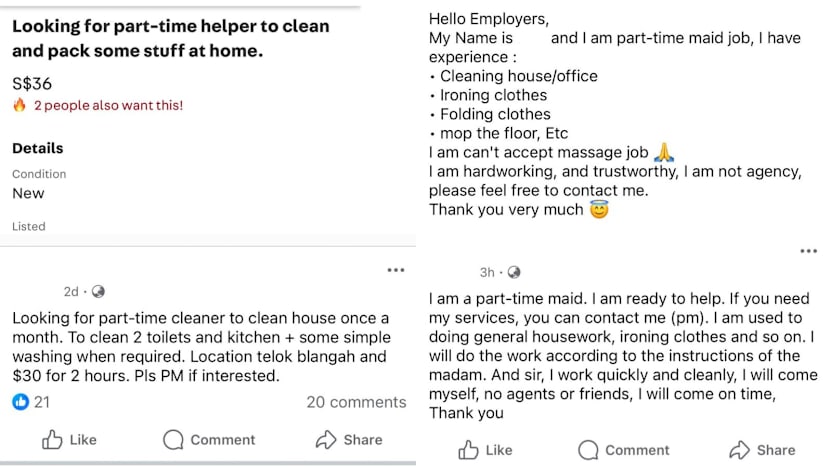Why some domestic helpers risk moonlighting – and what it could cost them
Last month, a domestic helper was fined S$13,000 (US$10,000) for doing part-time cleaning work for two unofficial employers.

“Migrant domestic workers who work illegally may have their work permits revoked and banned from working in Singapore,” a Ministry of Manpower spokesperson said. (Photo: iStock)

This audio is generated by an AI tool.
SINGAPORE: When a former employer asked her to help clean his house for just one day, migrant domestic worker Alice (not her real name) agreed, though hesitantly.
Although it is illegal for a helper to work part-time while already employed full-time, Alice said she felt indebted to her former employer, who had been “nice” to her.
“I cared for him, that’s why I went to help him once,” she said. For her efforts, she was paid S$200 (US$155) – which was around 25 per cent of her full month's salary.
While she felt thrilled to receive that amount for a single day’s work, she did not dare to moonlight again.
“I don’t want to risk it. Some other helpers may know you work part-time and tell other people, who can then make trouble for you,” she said, well aware that moonlighting while working for another employer on a valid work pass is outlawed here.
The issue gained public attention after a helper was fined S$13,000 (US$10,000) last month for working part-time for two unofficial employers, even though her work pass allowed her to work only for her official employer.
The unofficial employers were also penalised – one was fined S$7,000, and the other was issued an out-of-court fine of S$4,000.
For migrant workers, working part-time without a valid work pass is punishable by up to two years in jail, a fine of up to S$20,000, or both.
Employers who hire foreign workers without a valid work pass face up to 12 months' jail or a fine between S$5,000 and S$30,000, or both.
Responding to CNA's queries, a Ministry of Manpower (MOM) spokesperson said that the ministry takes a “serious view of illegal employment”.
Between 2020 and 2024, it took action against more than 80 migrant domestic workers annually for moonlighting. About 15 workers are prosecuted each year, with the rest receiving warnings and fines.
“Migrant domestic workers who work illegally may have their work permits revoked and banned from working in Singapore,” the spokesperson said.
Despite the stiff penalties that can exceed two years of a helper’s salary, moonlighting arrangements appear rampant online.
On a Facebook group called "Part-time Cleaner/Helper in Sgp", which has over 52,000 members, there are daily posts that seek or offer part-time domestic work and appear to be made by migrant domestic workers or local employers.
Some profiles claim they are not affiliated with any employment agency and openly post their availability.
Over on e-commerce site Carousell, there are also similar listings made by prospective employers looking for part-time helpers based on location, the duration of work required, as well as hourly rates that can go up to S$17.
Asked why they are willing to take on these jobs despite the risk, helpers told CNA that it depends on one's financial situation. Those with more pressing needs are more likely to accept moonlighting jobs as a last resort.
Filipino domestic worker Mattet, who wants to be known only by her first name, has worked in Singapore for 18 years. A single mother with five children in the Philippines, she recalled how cash flow is tight and there were times when she needed extra money to pay for her children’s school fees.
Her employers were supportive and allowed her to take salary advances.
“They always tell me not to work part-time, and that if there’s any issue for your family financially, you just come and talk to us, and then we can do whatever we can for you,” said the 46-year-old.
But not all employers are like hers, she added. For helpers who work for less understanding employers, dire straits can push them towards taking on illegal work.
“They’re stressed, because some families in the Philippines are asking for financial help, and even if they want to take off, they will want to spend time doing part-time work,” she said.

RISKS FOR BOTH WORKERS, EMPLOYERS: MOM
Responding to queries on why moonlighting is forbidden for maids, an MOM spokesperson said that having only one employer ensures “clear accountability over the (helpers’) welfare, minimises disputes and better safeguards the interest of both workers and employers”.
The spokesperson added that when helpers work for multiple employers by moonlighting, the “employer accountability structure” becomes unclear.
“Should a migrant domestic worker fall ill or sustain injuries while working elsewhere, the official employer remains liable for her upkeep and medical costs, even though the injury occurred outside their direct supervision and control,” said the spokesperson.
Moonlighting may also lead to physical and mental stress and those working illegally are not given legal protections.
For employers, those who hire moonlighting workers could be flouting work pass controls related to occupation, nationality, quota and levies.
“This creates an uneven playing field against other employers who comply with the work pass framework,” said the MOM spokesperson.
SHOULD HELPERS BE PENALISED HEAVILY?
Despite this, the MOM spokesperson said that not all moonlighting cases will result in prosecution.
"MOM takes into consideration various factors, including whether the foreigner had contravened the law wilfully and whether the period of offending was extensive and persistent, before deciding whether to prosecute," the spokesperson said.
In any case, the S$13,000 fine imposed last month on the maid has set tongues wagging among domestic workers about whether it is worth the risk.
Among the 10 maids that CNA spoke to over the past week, some feel that such penalties effectively deter helpers who are weighing whether to accept illegal jobs.
Alice, the helper who stopped moonlighting after one time, said she had little sympathy for those caught after doing it repeatedly.
To her, maids are aware of the grave consequences.
“It’s their fault also; they want to go work part-time when they already have work, and they already know that it’s risky and not allowed,” she said.
On the other hand, some felt that personal circumstances should matter. After all, domestic helpers might not be doing so out of greed but due to anxieties back home.
To this end, Filipino domestic worker Christina Vega said the penalties are disproportionately harsh on helpers as some need the extra cash.
“I know the law here is very strict, but they also should think about the situation of each person that is involved and why they do it, it’s not like stealing or a scam,” said the 37-year-old.
Dr Stephanie Chok, executive director of non-governmental organisation Humanitarian Organisation for Migration Economics (HOME), argued that while such part-time work goes against work permit stipulations, heavy penalties are not necessary.
She believes helpers should not be criminalised as they are “financially vulnerable and take up these job offers due to economic pressures”.
“If the intent is to discourage such practices, it should be sufficient for employers, who create the demand through such job opportunities, to be penalised,” she said.
She added that in the longer term, authorities should consider the underlying reasons for the continued demand for ad hoc and affordable part-time household labour and “work towards alternative solutions instead of meting out such severe penalties”.
Dr Chok said that helpers are often under significant financial pressure as breadwinners and are especially vulnerable when family members fall ill, or if there are natural disasters back home.
They also earn a pay ranging from about S$400 to S$800 a month, she said.
“There is no social protection for migrant domestic workers and, with their low salaries, there is a need to ensure sufficient savings for when they can no longer engage in domestic work and/or when they want to return to their home countries.
FINANCIAL STRESS, LIMITED OPTIONS
Echoing this, helpers gave CNA further insight into why those with an urgent need for money are tempted by the numerous offers from Singapore employers to moonlight.
Some also spoke of the existence of informal arrangements in which the unofficial employers are relatives who live in different households, which can make it hard for maids to reject such requests.
According to MOM's website, such arrangements are allowed primarily for maids to take care of the employer's child or parent while they are at a relative’s house, and the ministry must be notified before proceeding.
Employers must also ensure that the helper does not perform the "full load of housework in both households", the website said.
If the helper needs to stay overnight to take care of the employer’s child or parent at the relative’s house, the employer also needs to ensure her accommodation meets the requirements, which include adequate shelter, basic amenities and sufficient ventilation.
But such minor clauses and stipulations may not be fully clear to helpers, some helpers said.
Filipino Maria Josie, who has worked in Singapore since 1993, said that some helpers also happen to have “plenty of time” available to do extra work.
“Maybe sometimes they don’t know there’s a law for that, sometimes they know and take some risk if there’s debt back home,” said the 53-year-old, who said she has never done any part-time work in her 32 years here, and that her employers have been firm about it.
Ultimately, helpers are lured by the prospect of monetary gains and the absence of any other ways to resolve their family's financial stress.
One helper who spoke to CNA on the condition of anonymity said she knew of a friend who was frequently moonlighting once a week from 2004 until 2018. She returned back to the Philippines after that.
The friend was a single mother of four and had to pay for various fees, such as her children’s education, something which the extra money helped her to achieve.
“She knows it is dangerous, but she told me that she still rather have pride in herself and work part-time than to steal, and she told me to just pray for her,” said the 55-year-old.
Her friend's employer denied her request for advance payment of her salary.
“She didn’t have any other option,” the helper said.
EMPLOYERS DEPLOYING MAIDS ILLEGALLY
Speaking to CNA, some maid agencies said employers value the flexibility offered by a part-time helper.
For one, there is no commitment to any packages and the services can be ad hoc if they are referred to by friends, said a staff member at a maid agency in Lucky Plaza who did not want to be identified.
“In the normal market, part-time services are by the hour, so they can’t ask for additional help beyond the working hours. But if they know the helper through a friend, they can ask for additional hours, and it’s more flexible,” he said.
He added that there is also greater trust in the helper’s work if it is a friend who recommends their helper to them.
Dr Chok said that illegal deployment is a “persistent and common complaint” made by helpers who seek refuge at HOME’s shelters.
HOME has encountered 174 such cases in the last two years in which helpers are made to work for multiple households or provide care for others outside the household.
She added that some are also illegally deployed to support home-based businesses.
"It is often difficult for the workers to prove such illegal deployment and while some may get transfers, in our experience, many have been repatriated back to their home countries by their errant employers," said Dr Chok.


















